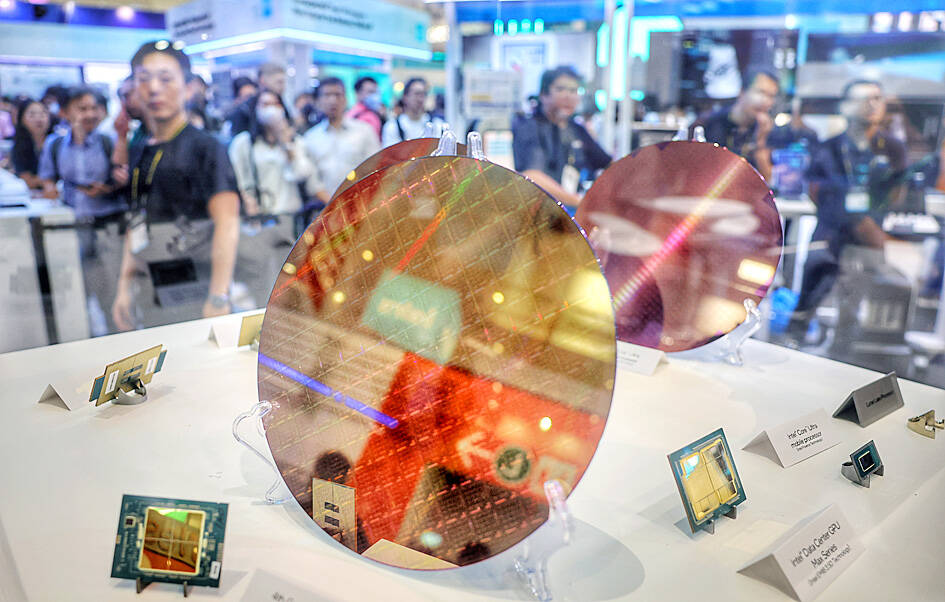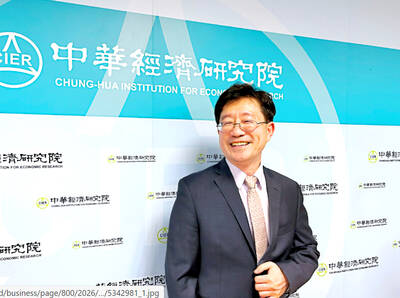Taiwan should collaborate with trusted partners to maintain its edge in advanced semiconductor manufacturing, while also confronting China’s increasing global share of legacy chip production, a panel of experts told a forum in Taipei yesterday.
While Taiwan enjoys a “strong and capable” ecosystem in advanced semiconductor manufacturing, it needs to continue working with global partners to “build up the alliance [and] interconnections,” former US security official Joe Wang said.
Additionally, Taiwan should collaborate with those partners on boosting the production of legacy chips, Wang said, referring to less advanced semiconductors that are used in household appliances and automobiles, among others.

Photo: CNA
Global legacy chipmaking has increasingly become “skewed toward China,” Wang said, adding that the situation was “extremely concerning.”
The Chinese government has subsidized production of legacy chips “in a way that none of the rest of our countries can do,” adding that such an approach was not business-driven, but aimed at expanding Beijing’s political influence, Wang said.
Cooperation between trusted partners is needed to balance China’s competitiveness in manufacturing legacy chips, also known as mature nodes, he added.
Wang, who spoke in his capacity as a senior advisor at the Virginia-based think tank Special Competitive Studies Project, previously served as the US National Security Council’s director for Russia.
His comments echoed those of US Secretary of Commerce Gina Raimondo, who in April said that China was producing about 60 percent of legacy chips in the world and would continue to do so in the coming years.
The surge in Chinese production was partly caused by US-led export bans on advanced chips and chipmaking equipment to China on national security grounds, some observers said.
Sharing Wang’s concerns, Institute of Geoeconomics director Kazuto Suzuki cautioned against complacency and underscored prioritizing the maintenance of “technological superiority.”
“We cannot just sit and relax,” he said.
China was also striving to make advanced chips, despite facing restricted access to those that power artificial intelligence and other cutting-edge technologies, Suzuki added.
Suzuki urged Japan and Taiwan to further explore collaboration opportunities for semiconductor research and development, such as facilitating the exchanges of technologies, ideas and people.
“Friendshoring is not just about production and trade,” he said. “Friendshoring is also about how to share the information, how to share intellectual property [and] how to maintain those movements of people.”
The Japanese expert was alluding to an emerging trend in trade where supply chain networks prioritize countries seen as political and economic partners.
South Korean economist Yeon Won-ho, a member of the South Korean Presidential Office’s policy advisory committee, also called for cooperation between his country and Taiwan, saying that the two were not “competitors,” but were “complementary” to each other.
One key area for possible collaboration between Taiwan and South Korea is information and communication technology services and devices, Yeon said.
This represents an emerging market, Yeon said, particularly as the US government seeks to ban Chinese-made communications and automated driving systems in cars for fear of data collection by Chinese companies.
The forum was co-organized by the Research Institute for Democracy, Society and Emerging Technology, a national think tank established in October last year under Taiwan’s National Science and Technology Council.

The Grand Hotel Taipei on Saturday confirmed that its information system had been illegally accessed and expressed its deepest apologies for the concern it has caused its customers, adding that the issue is being investigated by the Ministry of Justice Investigation Bureau. The hotel said that on Tuesday last week, it had discovered an external illegal intrusion into its information system. An initial digital forensic investigation confirmed that parts of the system had been accessed, it said, adding that the possibility that some customer data were stolen and leaked could not be ruled out. The actual scope and content of the affected data

DO THEY BITE IT? Cats have better memories than people might think, but their motivation is based entirely around the chance of getting fed Cats can remember the identity of the people who fed them the day before, Taipei-based veterinarians said on Friday, debunking a popular myth that cats have a short memory. If a stray does not recognize the person who fed them the previous day, it is likely because they are not carrying food and the cat has no reason to recognize them, said Wu Chou Animal Hospital head Chen Chen-huan (陳震寰). “When cats come to a human bearing food, it is coming for the food, not the person,” he said. “The food is the key.” Since the cat’s attention is on the food, it

Taiwan must act to preempt potential Section 301 investigations as US President Donald Trump moves to a new tariff strategy, following a US Supreme Court ruling that voided tariff measures, an academic said yesterday. Countries running the largest trade surpluses with the US face a growing likelihood of Section 301 investigations, Chung-Hua Institution for Economic Research president Lien Hsien-ming (連賢明) said. Section 301 refers to a provision of the Trade Act of 1974 that allows Washington to impose retaliatory tariffs over perceived unfair trade practices, including the running of large trade surpluses. Because Taiwan has become the fourth-largest source of the US’ trade

People hold incense and pray with offerings in front of Taipei’s Kuanghwa Market yesterday. The fifth day of the Lunar New Year is traditionally about welcoming the God of Wealth, during which companies and shops set off firecrackers to celebrate their reopening and pray for good business in the new year.